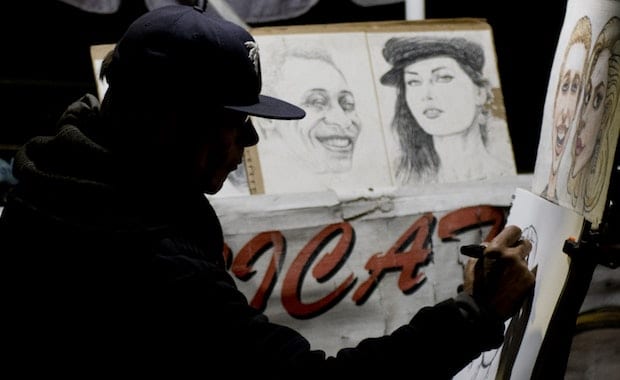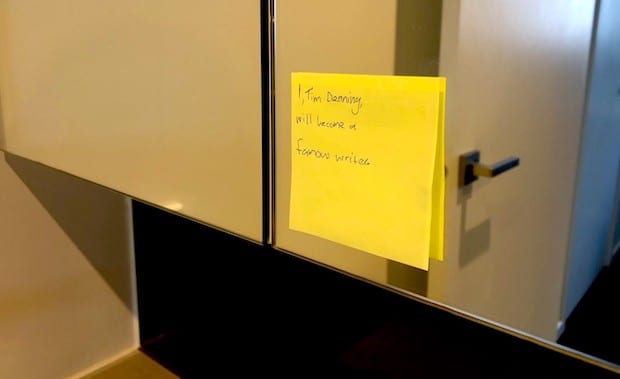Life
After Tragedy: 4 Thoughts To Consider

Last week was a tragic day for people that live in Melbourne, Australia. Lives were lost, and families were torn apart. We were reminded of just how close we can all come to death. Negativity struck again amongst a week filled with so much joy.
Everyone in Melbourne, including me, felt their heart sink as we rang our loved ones to make sure they were okay; as we desperately wanted to hear their voices.
As I texted my friends while gunshots happened close by, I was reminded of the terror that we can all face in nothing more than a split second. I said goodbye to an important client and had no idea that they were walking onto the street where terror was underway.
I thought to myself, as the event unfolded, “What if that’s the last time I see them? What if I had only spoken to them a bit longer rather than being in such a hurry to get to my next meeting?” Thankfully they were okay, but you never know.
My own mortality started to come into question. I too, like my client, was just about to step onto the street where people were being struck, and lives were being lost. If it weren’t for a colleague who stopped me in the corridor to chat, I would have been crossing the street at the exact moment that this devastating event unfolded.
Standing in the lobby, I saw many of my work colleagues run past me crying. They looked like they had just seen the most horrific event of their life – and they had. Amongst the madness of yesterday there are lessons to be learned
After tragedy, here are 4 thoughts to consider:
Thought #1 – We’re guaranteed only of this moment
An event like the one I’ve just described can happen at any time. None of us are guaranteed another breath. Tragedy is not designed to scare us; it’s designed to remind us of how important it is to be present.
We’re only on this planet for a blink of an eye in the grand scheme of things, and we forget that so easily.
Thought # 2 – Perspective is crucial
Instead of rushing out the door and being in a hurry to get to work, be grateful and tell your family how much you love them. Don’t forget how lucky you are even to have loved ones to care for.
A sense of perspective in your life is crucial. The person that cut you off in traffic or the one who went two minutes over in a meeting room you had booked, doesn’t really matter. Reacting to everything that comes into your line of vision will destroy your energy levels and force you to lose perspective.
Refocus your newfound energy from non-reactivity into energy that can be used to enhance the time with the people you really care about. Tragic events can remind us of what we should focus on, but it’s not enough and can be easily forgotten when the sadness subsides.
Thought # 3 – Don’t let this negative world win
What happened yesterday is a one-off incident. Every other day there are people getting married, babies being born, people realizsing their passion, and new lovers sharing a first kiss. This negative world and these one-off horrors can get you down if you let it.
We can decide to live in fear because of a few isolated, negative events, or we can rise up. We can become what we’ve always dreamt of and use these tragic events as fuel to our fire. We can stop procrastinating on what we should be doing and get on with our life’s purpose.
There’s so much good in the world. It’s just that the light doesn’t get shown on all of this positivity because it’s in overwhelming abundance. Negative events like the one above are actually very rare.
Anything that is rare is more likely to gain attention. Attention equals influence, and influence equals a powerful tool that can be used for the wrong reasons. I’ve always believed that attention and influence should be used for good and to help everyone around you rise up.
Thought # 4 – Compassion
When you think you got it bad, you don’t. Sitting here writing this blog post makes me realise that while I sip my overpriced tea and prepare for an entertaining evening, there are families right now dealing with the loss of a loved one.
These families are asking themselves the question, “Why now? Why did it have to happen this way? If only I did ‘X’ differently this may not have happened.”
In times of tragedy, we can practice the art of giving and go and help in some small way. Maybe it’s showing your support for the lives that have been affected. Maybe it’s buying some food for the emergency services people who worked through the night. Maybe it’s something as simple as showing a sign of respect and attending the various funerals.
When you show empathy for others, you reinforce a sense of abundance in your own mind. Your success is not about you; it’s about other people. Remember that.
For once, it’s time we stick together as a united community rather than judge. Forget about where we all come from, what color our skin is, who may have been criminally responsible, or anything else we could be doing right now. WE MUST UNITE WHEN TRAGEDY STRIKES!
Did You Know
How Skilled Migrants Are Building Successful Careers After Moving Countries
Behind every successful skilled migrant career is a mix of resilience, strategy, and navigating systems built for locals.

Moving to a new country for work is exciting, but it can also be unnerving. Skilled migrants leave behind familiar systems, networks, and support to pursue better job opportunities and a better future for their families. (more…)
Life
10 Research-Backed Steps to Create Real Change This New Year
This New Year could finally be the one where you break old patterns and create real, lasting change.

Every New Year, we make plans and set goals, but often repeat old patterns. (more…)
Life
9 Harsh Truths Every Young Man Must Face to Succeed in the Modern World
Before chasing success, every young man needs to face these 9 brutal realities shaping masculinity in the modern world.

Many young men today quietly battle depression, loneliness, and a sense of confusion about who they’re meant to be.
Some blame the lack of deep friendships or romantic relationships. Others feel lost in a digital world that often labels traditional masculinity as “toxic.”
But the truth is this: becoming a man in the modern age takes more than just surviving. It takes resilience, direction, and a willingness to grow even when no one’s watching.
Success doesn’t arrive by accident or luck. It’s built on discipline, sacrifice, and consistency.
Here are 9 harsh truths every young man should know if he wants to thrive, not just survive, in the digital age.
1. Never Use Your Illness as an Excuse
As Dr. Jordan B. Peterson often says, successful people don’t complain; they act.
Your illness, hardship, or struggle shouldn’t define your limits; it should define your motivation. Rest when you must, but always get back up and keep building your dreams. Motivation doesn’t appear magically. It comes after you take action.
Here are five key lessons I’ve learned from Dr. Peterson:
-
Learn to write clearly; clarity of thought makes you dangerous.
-
Read quality literature in your free time.
-
Nurture a strong relationship with your family.
-
Share your ideas publicly; your voice matters.
-
Become a “monster”, powerful, but disciplined enough to control it.
The best leaders and thinkers are grounded. They welcome criticism, adapt quickly, and keep moving forward no matter what.
2. You Can’t Please Everyone And That’s Okay
You don’t need a crowd of people to feel fulfilled. You need a few friends who genuinely accept you for who you are.
If your circle doesn’t bring out your best, it’s okay to walk away. Solitude can be a powerful teacher. It gives you space to understand what you truly want from life. Remember, successful men aren’t people-pleasers; they’re purpose-driven.
3. You Can Control the Process, Not the Outcome
Especially in creative work, writing, business, or content creation, you control effort, not results.
You might publish two articles a day, but you can’t dictate which one will go viral. Focus on mastery, not metrics. Many great writers toiled for years in obscurity before anyone noticed them. Rejection, criticism, and indifference are all part of the path.
The best creators focus on storytelling, not applause.
4. Rejection Is Never Personal
Rejection doesn’t mean you’re unworthy. It simply means your offer, idea, or timing didn’t align.
Every successful person has faced rejection repeatedly. What separates them is persistence and perspective. They see rejection as feedback, not failure. The faster you learn that truth, the faster you’ll grow.
5. Women Value Comfort and Security
Understanding women requires maturity and empathy.
Through books, lectures, and personal growth, I’ve learned that most women desire a man who is grounded, intelligent, confident, emotionally stable, and consistent. Some want humor, others intellect, but nearly all want to feel safe and supported.
Instead of chasing attention, work on self-improvement. Build competence and confidence, and the rest will follow naturally.
6. There’s No Such Thing as Failure, Only Lessons
A powerful lesson from Neuro-Linguistic Programming: failure only exists when you stop trying.
Every mistake brings data. Every setback builds wisdom. The most successful men aren’t fearless. They’ve simply learned to act despite fear.
Be proud of your scars. They’re proof you were brave enough to try.
7. Public Speaking Is an Art Form
Public speaking is one of the most valuable and underrated skills a man can master.
It’s not about perfection; it’s about connection. The best speakers tell stories, inspire confidence, and make people feel seen. They research deeply, speak honestly, and practice relentlessly.
If you can speak well, you can lead, sell, teach, and inspire. Start small, practice at work, in class, or even in front of a mirror, and watch your confidence skyrocket.
8. Teaching Is Leadership in Disguise
Great teachers are not just knowledgeable. They’re brave, compassionate, and disciplined.
Teaching forces you to articulate what you know, and in doing so, you master it at a deeper level. Whether you’re mentoring a peer, leading a team, or sharing insights online, teaching refines your purpose.
Lifelong learners become lifelong leaders.
9. Study Human Nature to Achieve Your Dreams
One of the toughest lessons to accept: most people are self-interested.
That’s not cynicism, it’s human nature. Understanding this helps you navigate relationships, business, and communication more effectively.
Everyone has a darker side, but successful people learn to channel theirs productively into discipline, creativity, and drive.
Psychology isn’t just theory; it’s a toolkit. Learn how people think, act, and decide, and you’ll know how to lead them, influence them, and even understand yourself better.
Final Thoughts
The digital age offers endless opportunities, but only to those who are willing to take responsibility, confront discomfort, and keep improving.
Becoming a man today means embracing the hard truths most avoid.
Because at the end of the day, success isn’t about luck. It’s about who you become when life tests you the most.
Change Your Mindset
The Four Types of Happiness: Which One Are You Living In?
Most people chase success only to find emptiness, this model reveals why true happiness lies somewhere else.

In a world driven by rapid technological growth and constant competition, many people unknowingly trade joy for achievement. (more…)
-

 News3 weeks ago
News3 weeks agoBrandon Willington Builds 7-Figure Business by Ignoring Almost Everything
-

 Health & Fitness4 weeks ago
Health & Fitness4 weeks agoWhat Minimalism Actually Means for Your Wellness Choices
-

 Did You Know3 weeks ago
Did You Know3 weeks agoWhy Most Online Courses Fail and How to Fix Them
-

 Business4 weeks ago
Business4 weeks agoIf Your Business Internet Keeps Letting You Down, Read This
-

 Business2 weeks ago
Business2 weeks agoEntrepreneur’s Guide to Pay Stubs: Why Freelancers and Small Business Owners Need a Smart Generator
-

 Business2 weeks ago
Business2 weeks agoThe Salary Shift Giving UK Employers An Unexpected Edge
-

 Scale Your Business2 weeks ago
Scale Your Business2 weeks ago5 Real Ways to Grow Your User Base Fast
-

 Business2 weeks ago
Business2 weeks agoThe Simple Security Stack Every Online Business Needs
























2 Comments